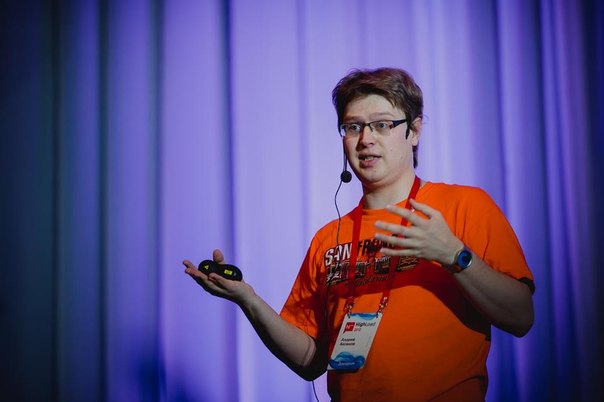How IT professionals work. Andrei Aksenov, founder of the Sphinx project

We continue to ask specialists about the mode of work and rest, professional habits, the tools they use, and much more.
It will be interesting to find out what unites them, in what they contradict each other. Perhaps their answers will help to identify some general patterns, useful tips that will help many of us.
Today our guest is Andrei Aksenov, the founder of the Sphinx project. Andrew is quite skeptical of life hacks. They are not his main assistants in increasing personal effectiveness.
')
What do you do in the company?
Everyone in a row - that's what I am the founder of. Sometimes I write code, but more and more such tasks as negotiations, correspondence by mail and the like appear.
One phrase (phrase) best describes how you work:
Seizures
How many hours a day do you spend on work?
From 0 to 20 hours.
How many hours do you sleep?
To 0 to 6-8 hours. Zero happens, thank God, not every year.
Do you have breakfast
Hardly ever. Mostly drink coffee. Sometimes I add a sandwich.
Do you live in Moscow?
Yes.
How long does it take to go to the office?
I work from home. Therefore, thank God, I don’t have to go anywhere. Of course, sorties sometimes happen, but this is not a daily phenomenon.
And if you have to go somewhere, how do you spend your time on the road?
Read books.
What issue tracker'om / repository do you use?
For historical reasons, we use Mantis. Now it is not known what we would use instead. Repository - Git.
What tools, frameworks do you use for development?
We are a team that writes open source mainly for Linux, so we write it, of course ... in Visual Studio (smiles).
Do you have any internal projects or libraries in your company and why were they created?
There is any "strapping small things." I would not call it internal projects.
What kind of todo-manager do you use personally?
Text files, as well as a program for Windows, which glues stickers to the desktop.
What annoys you most when you work?
When something really fails.
What professional literature would you recommend?
This is the moment of my personal ignorance. Or, on the other hand, self-education. I was once forced to form non-statutory methods.
I have suspicions (I emphasize: suspicions) that I could advise Knut, “The Perfect Code” and a couple of similar books. But since I did not read them from cover to cover, I would not risk it.
What do you prefer: electronic reading rooms or paper books?
Electronic reader Usually, I have the following reading cycle: "telephone - Kindle - telephone".
What technology (computers, tablets, smartphones) and operating systems do you prefer at work and at home?
Historically, I use Windows. There were attempts to switch to Linux, but the habit and ease of use of Windows overpowered. Phone - Android.
Do you listen to music when you work?
I listen almost constantly. Sometimes I cut down in some difficult moments.
Which life hack allows you to be more efficient?
There is a set of simple standard techniques that I worked at different times. One of them is the GTD technique with a tomato [Pomodoro - editor's note].
There were stickers on the desktop, physical stickers.
Sometimes it happens that gradually everything stops working.
What applications and services can you do without in your work or in your personal life?
You will not know until you try to refuse them (smiles). Probably, this is a standard set of Skype-mail-phone, as well as IDE Visual Studio and Github.
What would Andrei Aksenov write in a letter to the future to himself?
I do not see the point: in the future I either will not be able to well forget what was in the past; or I won’t be interested in what that person from the past has written there.
You have come a long way. And someone is now at the beginning of this path. What would you recommend to a person trying to go the same way?
Since I am a developer, the advice will be about the development.
This job is the same as the others - with its pluses and minuses. Therefore, if in doubt or want to try yourself in something else, it may be worth thinking about it well.
If you are still sure that you are here, then for you the second tip is an individual approach to the projectile. I advocate algorithmic fundamentalism: “Learn the base, pozzons.” Teach it very well, teach it so that it bounces off your teeth. After that, any arbitrarily fashionable or old, time-tested technology will be within your reach, and you will cope with them rather quickly.
Source: https://habr.com/ru/post/318626/
All Articles